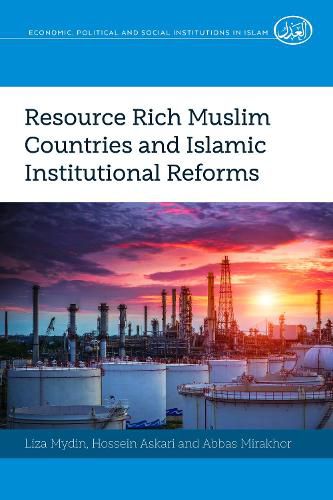Readings Newsletter
Become a Readings Member to make your shopping experience even easier.
Sign in or sign up for free!
You’re not far away from qualifying for FREE standard shipping within Australia
You’ve qualified for FREE standard shipping within Australia
The cart is loading…






This title is printed to order. This book may have been self-published. If so, we cannot guarantee the quality of the content. In the main most books will have gone through the editing process however some may not. We therefore suggest that you be aware of this before ordering this book. If in doubt check either the author or publisher’s details as we are unable to accept any returns unless they are faulty. Please contact us if you have any questions.
Resource Rich Muslim Countries and Islamic Institutional Reforms explores the resource curse, a condition in which a country’s abundance of natural resources is negatively linked with the country’s development and economic growth, in resource rich Muslim countries. The resource curse puzzle has been studied for over twenty years, with prior researchers looking to prove its existence and explore its causes. Recent studies have begun to indicate institutional failure as a likely cause of the curse, as wealth of resources tends to cause counterproductive behaviors such as rent-seeking, patronage and corruption. The subpar economic performance of resource rich Muslim countries in the Organization of the Islamic Cooperation (OIC) could be attributed to the manifestation of a resource curse. Collectively, the member countries of the OIC contribute over 9% of the world’s total GDP with 22.8% of the world’s population. Saudi Arabia and the United Arab Emirates alone contribute about 17% of world oil production. Resource rich Muslim countries should be at the forefront of economic performance and growth, yet we see the opposite when we compare the performance of these countries to countries that are not resource rich (such as Spain, France, Hong Kong and Japan). Through an analysis of sample countries, the authors have discovered that natural resources exert a drag on the countries’ economic growth, thereby indicating the presence of the resource curse. Their research also found weaknesses in the quality of institutions as the cause of the curse. To counteract the negative effects of the resource curse in resource rich Muslim countries, the authors provide a number of Islamic institutional reforms.
$9.00 standard shipping within Australia
FREE standard shipping within Australia for orders over $100.00
Express & International shipping calculated at checkout
This title is printed to order. This book may have been self-published. If so, we cannot guarantee the quality of the content. In the main most books will have gone through the editing process however some may not. We therefore suggest that you be aware of this before ordering this book. If in doubt check either the author or publisher’s details as we are unable to accept any returns unless they are faulty. Please contact us if you have any questions.
Resource Rich Muslim Countries and Islamic Institutional Reforms explores the resource curse, a condition in which a country’s abundance of natural resources is negatively linked with the country’s development and economic growth, in resource rich Muslim countries. The resource curse puzzle has been studied for over twenty years, with prior researchers looking to prove its existence and explore its causes. Recent studies have begun to indicate institutional failure as a likely cause of the curse, as wealth of resources tends to cause counterproductive behaviors such as rent-seeking, patronage and corruption. The subpar economic performance of resource rich Muslim countries in the Organization of the Islamic Cooperation (OIC) could be attributed to the manifestation of a resource curse. Collectively, the member countries of the OIC contribute over 9% of the world’s total GDP with 22.8% of the world’s population. Saudi Arabia and the United Arab Emirates alone contribute about 17% of world oil production. Resource rich Muslim countries should be at the forefront of economic performance and growth, yet we see the opposite when we compare the performance of these countries to countries that are not resource rich (such as Spain, France, Hong Kong and Japan). Through an analysis of sample countries, the authors have discovered that natural resources exert a drag on the countries’ economic growth, thereby indicating the presence of the resource curse. Their research also found weaknesses in the quality of institutions as the cause of the curse. To counteract the negative effects of the resource curse in resource rich Muslim countries, the authors provide a number of Islamic institutional reforms.